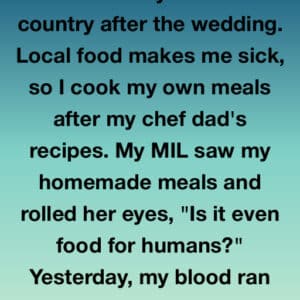When I placed our grandmother’s jewelry on my sister’s coffee table, right in front of her carefully curated circle of friends, the look on her face was worth more than every stolen diamond and pearl she pawned for that ridiculous red convertible. For once, Sophia couldn’t charm or lie her way out of it. And frankly, it was about time.
I used to believe that family meant loyalty, kindness, and trust. That no matter what, we looked out for each other. But sometimes, the deepest betrayal doesn’t come from enemies—it comes from the person sitting across the table at Thanksgiving, smiling with the same eyes you grew up with.
It started with a phone call.
I was working from home when my grandmother, Carol, rang. Her voice wavered, not from age, but something heavier.
“Joyce, honey… have you seen my jewelry?”
I blinked. “What do you mean?”
“My wedding band, my mother’s pearls… the bracelet your grandfather gave me on our anniversary. They’re gone.”
My stomach dropped.
Grandma isn’t careless. She doesn’t misplace things. Her jewelry box—an old, beautifully carved thing—was her little time capsule. She didn’t wear them often, but every Sunday she’d open the lid just to look, to remember. Those pieces weren’t about money. They were memory made tangible.
I told her I was coming over.
When I arrived, she was sitting on the couch, the jewelry box open in her lap, trembling fingers hovering over its empty velvet lining.
I already knew what she would say when I asked who had visited.
“Your sister… Sophia. She stopped by yesterday.”
Of course she did.
Sophia—the family’s princess. The kind of person who thought hardship was not getting enough likes on Instagram. Jobless, drowning in credit card debt, and constantly demanding more from everyone around her.
Grandma’s eyes were glassy. “She wanted to try them on. I didn’t think… I didn’t think she’d actually take them.”
One tear rolled down her cheek. That was it for me.
“I’ll handle it,” I promised. “She doesn’t get to break your heart and walk away.”
Grandma whispered, “Don’t start a fight. She’s still your sister.”
No. Not this time.
I drove straight to our parents’ house where Sophia still lived, mooching like a pro. And there it was, gleaming in the driveway like a slap in the face—a brand-new cherry-red convertible.
I stormed in and found her in the kitchen, scrolling on her phone like she hadn’t just violated our grandmother’s trust.
“Where’s Grandma’s jewelry?” I demanded.
She didn’t even blink. “What are you talking about?”
“The pearls, the bracelet, her wedding band. Where. Are. They?”
“Oh my God, Joyce, calm down.” She rolled her eyes. “It’s not a big deal. They were just sitting there. She never even wore them. I needed a car. It was on sale. I pawned them.”
She tossed her hair, like she’d just confessed to skipping class instead of stealing a lifetime’s worth of memories.
“You didn’t steal them? You repurposed them?” I asked, stunned.
She shrugged. “Grandma’s fine. I’m the one struggling. This car? It’s an investment in my future. You don’t get it—image matters.”
I walked out without another word. There was nothing left to say. She didn’t feel guilt. She didn’t even feel bad.
But she was about to feel something.
That night, I returned to the house while she was out. I knew Sophia—messy with everything but her makeup. If she pawned the jewelry, she left a receipt somewhere.
And there it was, carelessly tossed on the kitchen counter: a crumpled pawn shop slip with the address printed in bold.
The next morning, I was at the shop the minute it opened.
The owner was kind and surprisingly understanding. After I explained, he sighed and said, “You wouldn’t believe how often this happens. People don’t realize what they’re really selling until someone cries in my store.”
It cost nearly every penny I had saved to buy back those pieces. But I would’ve spent double to see Grandma’s wedding ring back in my palm.
Then came the best part.
A few days later, Sophia threw one of her little social events. Her friends were gathered, sipping overpriced wine, laughing too loudly. I walked in holding Grandma’s jewelry box like a trophy.
Sophia looked up and froze. “Joyce? What are you doing here?”
“I thought you might want these back,” I said sweetly, placing the box right in the center of the table.
She looked inside and went pale.
Her friends leaned in, eyes wide. “Oh wow… are those real?” one of them whispered.
I smiled. “They should be. She sold them to buy that convertible out front.”
Sophia gasped. “You didn’t have to say that in front of everyone!”
I leaned closer, my voice low and sharp. “Oh, but I did. You weren’t sorry when you stole from Grandma. But now that your image is at stake? Suddenly you care?”
Her face burned red. Her friends stared at her, no longer laughing.
I finished quietly, just for her: “You’re returning the car. You’re giving Grandma every cent back. Or I’ll make sure the entire city knows what kind of person you really are.”
She knew I meant it.
The next day, she returned the car. Lost money on the trade-in, too. But every dollar she got went straight back to Grandma.
And Grandma? She forgave her. Because she’s better than I am.
I’ll be polite. I’ll be civil. But I’ll never forget.
Because sometimes the only language people like Sophia understand… is the one spoken when they’re finally caught under a spotlight they can’t control.





